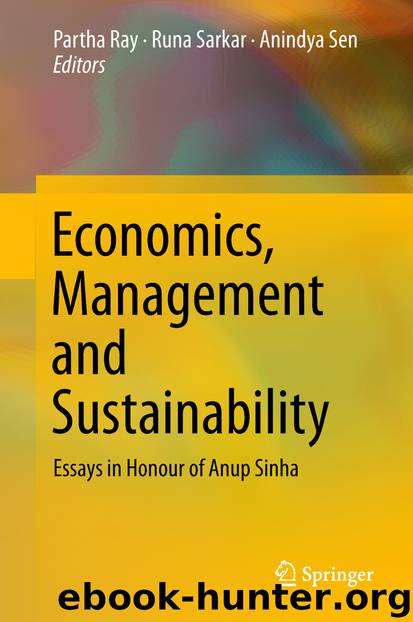Economics, Management and Sustainability by Unknown

Author:Unknown
Language: eng
Format: epub
ISBN: 9789811318948
Publisher: Springer Singapore
Part III
Sustainability and Corporate Governance
© Springer Nature Singapore Pte Ltd. 2018
Partha Ray, Runa Sarkar and Anindya Sen (eds.)Economics, Management and Sustainabilityhttps://doi.org/10.1007/978-981-13-1894-8_9
Sustainable Eco-Management: Participatory Mechanisms and Institutions
Sarmila Banerjee1
(1)University of Calcutta, Kolkata, India
Sarmila Banerjee
Email: [email protected]
Participatory approach in managing development projects and programs in poor countries has emerged in response to global demands for greater individual and societal control over the activities of state and private agencies, and especially to the overt failures of traditional ‘top-down’ management systems in LDCs (Brett 2003). Beneficiary participation is a special form of decentralized development management where the development projects are locally implementable and the micromanagement is coordinated with the macro-priorities to ensure long-term sustainability. Here, not only do the local authorities take decisions at the local level but there is a harmonious interaction among the provider, regulator and the service recipient (Chopra and Kadekodi 1991; Paul 1989). In fact, it is a cooperative management approach where all stakeholders would take up an active role and enjoy equal status in the process of decision making and execution. The programs are motivated mostly by livelihood approach with high values attached to an enhanced access to social capital. Drawing examples from Canadian inland small-scale fisheries, it has been shown by Berkes (2003) that instead of a top-down experts-know-best type control-oriented management strategy, a participatory approach can guarantee better sustainable livelihood where social and ecological combination of governance practices through coping, learning and adaptation is capable of delivering more resilient outcomes.
However, it has been shown by many social scientists that though the participatory approach is conceptually more democratic, its success potential is highly dependent on the local conditions. Experience shows that co-management regimes can set into motion new conflicts or cause old ones to escalate. Instead of contributing to local empowerment, such arrangements may further marginalize communities and resource users (Castro and Nielsen 2001). Sarkar and Sinha (2015) proposed an exploratory framework to study development management from the perspective of strategic interventions where the specific requirements for the success of the participatory approach have been nicely schematized. The participatory approach commonly fails in contexts where local conditions make cooperative and collective action very difficult, or where it is manipulated by implementing agencies to justify their own actions and/or poor performance. In practice, the result may not be power sharing but rather a strengthening of the state’s control over resource policy, management and allocation. Instead of contributing to local empowerment, such arrangements may further marginalize communities and resource users and make the program non-viable.
This chapter draws on a number of studies conducted by the present author and her co-researchers between 2007 and 2014 on different rural, peri-urban and urban pockets of the state of West Bengal, India, focusing on ecologically sustainable management of natural resource and environment like social forestry, wetland fisheries and municipal solid waste disposal in a co-management framework with active beneficiary participation.1 Since the contexts are distinct, there was variation in the notion of sustainable management itself and in the composition of the stakeholder groups. The design of
Download
This site does not store any files on its server. We only index and link to content provided by other sites. Please contact the content providers to delete copyright contents if any and email us, we'll remove relevant links or contents immediately.
Kathy Andrews Collection by Kathy Andrews(11832)
The remains of the day by Kazuo Ishiguro(8999)
Spare by Prince Harry The Duke of Sussex(5197)
Paper Towns by Green John(5191)
The Body: A Guide for Occupants by Bill Bryson(5097)
Industrial Automation from Scratch: A hands-on guide to using sensors, actuators, PLCs, HMIs, and SCADA to automate industrial processes by Olushola Akande(5061)
Machine Learning at Scale with H2O by Gregory Keys | David Whiting(4313)
Be in a Treehouse by Pete Nelson(4051)
Never by Ken Follett(3957)
Harry Potter and the Goblet Of Fire by J.K. Rowling(3857)
Goodbye Paradise(3810)
The Remains of the Day by Kazuo Ishiguro(3413)
Into Thin Air by Jon Krakauer(3399)
Fairy Tale by Stephen King(3399)
The Cellar by Natasha Preston(3344)
The Genius of Japanese Carpentry by Azby Brown(3309)
120 Days of Sodom by Marquis de Sade(3275)
Reminders of Him: A Novel by Colleen Hoover(3121)
Drawing Shortcuts: Developing Quick Drawing Skills Using Today's Technology by Leggitt Jim(3081)
